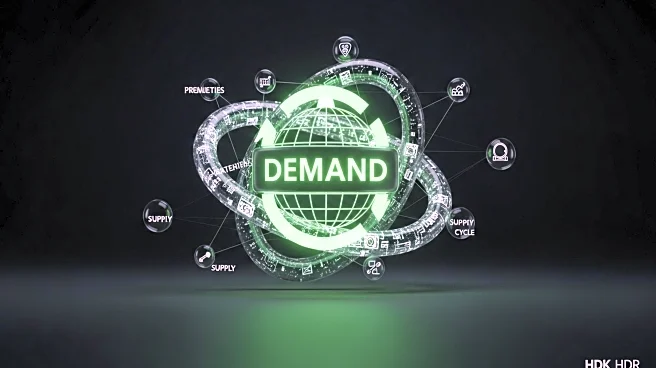What's Happening?
A recent analysis indicates that structural factors may be setting the stage for a new commodities super cycle, driven by supply vulnerabilities and strong demand trends. The report highlights that over 40% of global copper production is concentrated in Chile and Peru, while Australia and Brazil supply more than half of the world's iron ore. Additionally, China refines nearly 90% of rare earth elements and over 40% of the world's copper, creating geopolitical leverage points. The scarcity of high-grade deposits and the lengthy timelines for new mining projects further exacerbate supply constraints. On the demand side, electrification and decarbonization efforts are increasing the need for metals like copper, with the International Energy Agency predicting a potential supply shortfall of 30% by 2035. Technology firms' investments in AI data centers are also driving demand for energy and materials.
Why It's Important?
The potential onset of a commodities super cycle could have significant implications for global markets and economies, particularly in the U.S. As commodities become more valuable, industries reliant on these materials may face increased costs, affecting sectors such as manufacturing and technology. Investors might turn to commodities as a hedge against inflation and market volatility, given the current undervaluation relative to other asset classes. This shift could alter investment strategies and financial markets, impacting economic stability and growth. The concentration of supply in specific regions also poses geopolitical risks, potentially influencing international trade and diplomatic relations.
What's Next?
If a commodities super cycle begins, it may persist until halted by significant policy measures or technological advancements. Stakeholders, including governments and businesses, may need to adapt to changing market conditions and address supply chain vulnerabilities. The U.S. could see increased investment in domestic mining and processing capabilities to mitigate reliance on foreign sources. Additionally, policy makers might explore strategies to balance environmental goals with economic demands, ensuring sustainable growth and resource management.
Beyond the Headlines
The looming commodities super cycle raises ethical and environmental concerns, particularly regarding mining practices and resource exploitation. As demand for metals increases, the pressure on ecosystems and communities near mining sites may intensify, necessitating responsible and sustainable approaches. Long-term shifts in energy consumption and technological development could redefine industry standards and societal norms, influencing future economic and environmental policies.











